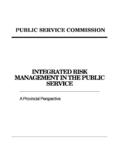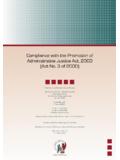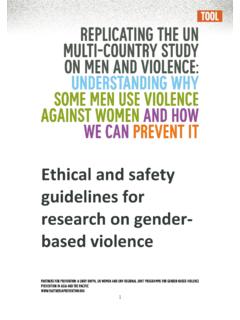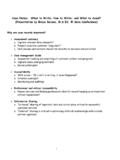Transcription of OFFICIAL MAGAZINE OF THE PUBLIC SERVICE …
1 NOVEMBER/DECEMBER 2010 OFFICIAL MAGAZINE OF THE PUBLIC SERVICE COMMISSIONR eflections on an Ethical PUBLIC SERVICE and SocietyNEWSPSC NewsPSC NEWS November/December 2010 VisionThe PUBLIC SERVICE commission is an independent and impartial body created by the Constitution, 1996, to enhance excellence in governance within the PUBLIC SERVICE by promoting a professional and ethical environment and adding value to a PUBLIC administration that is accountable, equitable, efficient, effective, corruption-free and responsive to the needs of the people of South PUBLIC SERVICE commission aims to promote the constitutionally enshrined democratic principles and values of the PUBLIC SERVICE by investigating, monitoring, evaluating, communicating and reporting on PUBLIC administration. Through research processes, it will ensure the promotion of excellence in governance and the delivery of affordable and sustainable quality NewsPSC NEWS November/December 2010 I iPSC NEWS November/December 2010 Page1.
2 From the Desk of the Editor ..12. State of Professional Ethics in the PUBLIC SERVICE Post 1994 ..33. Should PUBLIC Servants be allowed to do Business with Government? ..94. Cases of Conflicts of Interest in Departments A concern for SCOPA ..125. The Role of Financial Disclosures in Managing Conflicts of Interest ..146. Trading PUBLIC Knowledge for Private Gain: is the revolving door spinning out of control? ..187. Assessment of the State of Professional Ethics in the Free State, KwaZulu-Natal and Limpopo Provinces ..218. Management of Gifts in the PUBLIC SERVICE ..25 Table ofcontentsEditorHumphrey RamafokoDeputy EditorRicardo MahlakanyaEditorial TeamRalph MgijimaMashwahle DiphofaIndran NaidooMamaroba MalahlelaAssistantSammy MorweSend all your comments and editorial correspondence to: The Editor, PSC News, Private Bag X121, Pretoria, 0001 Commissioner HouseCnr Hamilton and Ziervogel Streets, Arcadia, 0083 Tel: (012) 352 1196 Fax: (012) 352 8344 Attention: Humphrey RamafokoEmail: expressed in PSC News are those of the authors and do not necessarily represent those of the Editor, Editorial Committee or the PUBLIC SERVICE commission .
3 Copyright of published articles rests with the Editorial NewsOver the past two decades, the PUBLIC SERVICE has gone through a remarkable transformation. The nation and the world has witnessed many changes in South Africa, such as the release of Nelson Mandela, the first democratic elections that ultimately ushered in the dawn of a new democracy and the birth of a new PUBLIC SERVICE . Since then, Government has introduced a number of mechanisms aimed at promoting a culture of professional ethics within the PUBLIC SERVICE , a sharp contrast from the apartheid regime that was characterised by secrecy and a lack of transparency. Such mechanisms include amongst others, the Prevention and Combating of Corrupt Activities Act, Minimum Anti-Corruption Capability Requirements, the National Anti-Corruption Hotline and the National Anti-Corruption PUBLIC SERVICE commission (PSC) has also made a significant contribution in the area of professional ethics in the PUBLIC SERVICE , and its research work is widely used by a number of stakeholders including Parliament, the Executive, government departments and academia.
4 Similarly, the PSC played a central role in the development of the Code of Conduct for the PUBLIC SERVICE and went on to further propose a conflicts of interest system in the PUBLIC SERVICE , which not only provides standards but also promotes integrity in government by preventing conflicts of interest before they occur. The PSC also developed the PUBLIC SERVICE Pledge, which was signed by Directors-General as a commitment to serve with the highest standard of loyalty, respect, dignity and integrity. It is on the basis of the above that the PSC deemed Reflections on an Ethical PUBLIC SERVICE and Society an apt theme for this edition of the PSC kick start this packed edition of the PSC News by looking at the State of Professional Ethics in the PUBLIC SERVICE post 1994, and touch on amongst others, different legislation and institutions that government established to promote integrity and PUBLIC has on several occasions posed the question: Should PUBLIC servants be allowed to do business with government?
5 Mr Kris Dobie of Ethics South Africa (ESA) responds to this question by looking at amongst others, the rights of PUBLIC servants and their spouses who are doing business with government. Likewise, Mr Themba Godi, Member of Parliament and Chairperson of the Standing Committee on PUBLIC Accounts (SCOPA), which oversees PUBLIC accounts, discusses some of the legislation that government has introduced to manage conflicts of interest within the PUBLIC SERVICE . Drawing on a report produced by the Auditor-General in 2008, Mr Godi illustrates the practical challenges around financial disclosures and financial misconduct, and he outlines the recommendations of SCOPA in this regard. While financial disclosures are a potentially useful integrity mechanism, their implementation needs strengthening, and they should be supported by other measures. Accordingly, we report on the role of the Financial Disclosures in Managing Conflicts of Interest and offer targeted recommendations towards improving implementation.
6 In its Report on Managing Conflicts of Interest in the PUBLIC SERVICE published in 2006, one of the key considerations that the PSC identified in developing a conflicts of interest framework was the introduction of From the desk of the editorHumphrey Ramafoko1 I PSC NEWS November/December 2010 PSC NewsPSC NEWS November/December 2010 I 2post employment measures. In this issue, Dr Collette Schulz-Herzenberg of the Institute for Security Studies looks at one of the post employment mechanism called the revolving door phenomenon, which is commonly understood as movement of people between government and the business conclude this edition, we put the State of Professional Ethics in the Free State, KwaZulu-Natal and Limpopo provinces under the microscope. This article analyses the various anti-corruption instruments and mechanisms in the mentioned provinces, and makes recommendations aimed at strengthening implementation.
7 Also, the PSC gives its perspective with regard to the Management of Gifts in the PUBLIC hope that you will find this edition reader-friendly, entertaining and informative. Likewise, we encourage all South Africans to use the available tools to report any acts of corruption in the PUBLIC SERVICE . The National Anti-Corruption Hotline for the PUBLIC SERVICE is (0800 701 701). Happy reading!!PSC News3 I PSC NEWS November/December 2010 By Dr Ralph Mgijima, Chairperson, PUBLIC SERVICE CommissionIntroductionGovernment has a duty to proactively promote a culture of honesty and good governance, which will in turn lead to effective and efficient SERVICE delivery. This requires a PUBLIC SERVICE that is professional, ethical and performs its duties and tasks with integrity. However, given the pressures that government departments are under, efforts to fight corruption are usually reactive. This is driven by the view that the visible fight against corruption is best appreciated in the reactive response to for building integrityTo a degree, the reactive response to fighting corruption dilutes efforts at building national integrity1.
8 Not only does corruption undermine government institutions and their ability to deliver to society, but in the end, it is the poor that are severely affected. It is therefore not surprising that, as the significance of social values become more apparent in the fight against corruption, a strong call is emerging for the building of national integrity systems through a consolidation of societal values. This is especially true for South Africa. High levels of corruption and low integrity in the South African PUBLIC SERVICE will negatively affect government s ability to meet the Millenium Development Goals (MDGs) which focus on critical areas such as halving poverty, achieving primary education, reversing the spread of HIV and AIDS and ensuring stability2. It is therefore important to build integrity in the PUBLIC need to build integrity derives from the Constitution which mandates the PSC to promote a high standard of professional ethics by amongst others, promoting and instilling values such as accountability and transparency.
9 An example of where accountability and transparency were not exercised emerged when the Auditor-General reported on government employees who have entities that are doing business with government departments. In his report the Auditor-General points out that: forty-nine (49) government employees are directors or members of companies or close corporations (CCs) that are doing business with national departments. The total amount paid to these companies and CCs during the period April 2005 to January 2007 was approximately R35,7 million. Most of these employees who are directors or members of companies or CCs that did business with national departments failed to disclose their interests and did not obtain approval from the Executive Authorities to perform work outside of the PUBLIC SERVICE . The amount involved in terms of the non-disclosures is R30,6 million appears, therefore, that there is a link between the improper accumulation of wealth and the lack of transparency and accountability.
10 The PSC is of the view that any ad-vantage gained improperly by PUBLIC officials , such as in the above ex-State of professional ethics in the PUBLIC SERVICE post 1994Dr Ralph Mgijima_____ _____1 Speech by Ms GJ Fraser-Moleketi at the Global Forum V held in Johannesburg, South Africa, April Guide to the Millenium Development Goals, European commission to South Africa, Republic of South Africa: Auditor-General: Report of the Auditor-General to Parliament on a Performance Audit of Entities that are connected with Government Employees and doing business with National Departments, NewsPSC NEWS November/December 2010 I 4ample, leads to the breakdown in trust between PUBLIC officials and the citizenry. Once citizens lose trust in PUBLIC officials to deliver on the man-date of government accountability and transparency, government loses all credibility in the eyes of the PUBLIC . This leads to fertile ground for cor-ruption to occur which in turn will undermine the ability of government to deliver services fairly and equita-bly.















